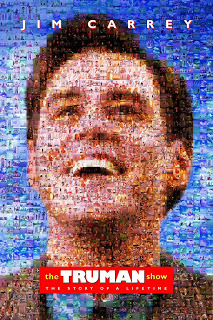OUR LIFE IN “THE TRUMAN SHOW”

January 12, 2018
We are living our own versions of The Truman Show everyday.
Trees, grass, beaches, communities, weather, an ocean; this sounds like a normal world…too bad it’s all fake.
“The Truman Show,” a sci-fi-ish masterpiece of control and manipulation, is about a Hollywood television program company that created the largest man-made set in the world, a stunning domed utopia representing aspects of the real world, including weather, advertising, and normal daily living.
The main character, Truman Burbank (Jim Carrey), doesn’t know it yet, but his life is the key feature of this massive set. The show´s producer Christof (Ed Harris) has almost 5,000 hidden cameras capturing Truman´s every move. In the film, Truman is in his 30s and has a generic corporate job, suburban house, and a wife. Truman’s life is entirely fake and, since he was adopted by the production company as a newborn, he has no clue.
This may all seem fantastic, frightening, far-fetched, yet we are living like this…voluntarily.
Everyone Has Access To Our Information
Hey! That pic you just posted on your Finsta is out there for everyone to see. Each and every person who uses social media is willing to broadcast their lives to anyone and everyone willing to see it. Our lives can be translated into digital formats and pumped out to the masses.
People use Facebook, Snapchat, Twitter, Instagram, Pinterest, Youtube, etc., to tell others what they are doing, where they are going, what they are eating, who they are with, and how they are feeling. More often than not, users put out information that is way too personal.
Those 5,000 cameras are watching Truman at every angle; we can see what he does at work, where he walks in town, what stores he visits, and most of the things he does in his own home. Wait, this is all earily familiar.
Everyone You Know Is An Actor
In the movie, Truman’s best friend, wife, parents, coworkers, and neighbors are all hired actors. This can be seen in daily life because those around us are “actors,” with different personas for different situations.
How often do we truly act ourselves around others? Some of us might act like a fool in front of our friends, frolick around and tell inappropriate jokes, but around our parents we are cautious of our actions. Most people put on a show, so to speak; they change themselves to please their audience, or in our case, our peers.
People Only Care About You While You Are Relevant
When “The Truman Show” comes to its inevitable end, it’s no longer relevant. After decades of airtime of this show (not to mention audiences becoming attached to Truman), all viewers could say was “What should we watch next?” Two security guards who frequently tuned in witnessed the show’s end and one says to the other, “where’s the TV Guide, let’s see what’s on.”
A good example of this is YouTube fall-outs. Remember the “Harlem Shake?” Yeah, well, it’s not a household name because of its eventual irrelevance; As the fad became old, people began to not care about it, and participate less and less, as it they lost interest. The same goes for, say, “Charlie the Unicorn” as well. No one uses this once major viral video in any context in modern day.
The idea of relevancy and the effect it has on the viewers in the movie proves how quickly people lose interest in something. In fact, as soon as celebrities, or even everyday people, no longer interest or entertain an audience, they are basically dead to viewers.
It’s a science! Sounds harsh, but it is a reality we all face as humans. Doctor Glenn Geher from Phsycology Today explains how it’s in our biochemistry; by nature as humans, we only care about the things, ideas, and other humans that affect us in a positive way. This reality is not necessarily a good or bad thing, it just “is what it is.”
Through the eyes of someone who might have seen the movie’s premiere, this is a horror film, with an erie tone. Yet, through the eyes of this young generation, “The Truman Show” might not be so strange. We are happy to be watched and “followed” through our lives. Maybe we shouldn’t be.
